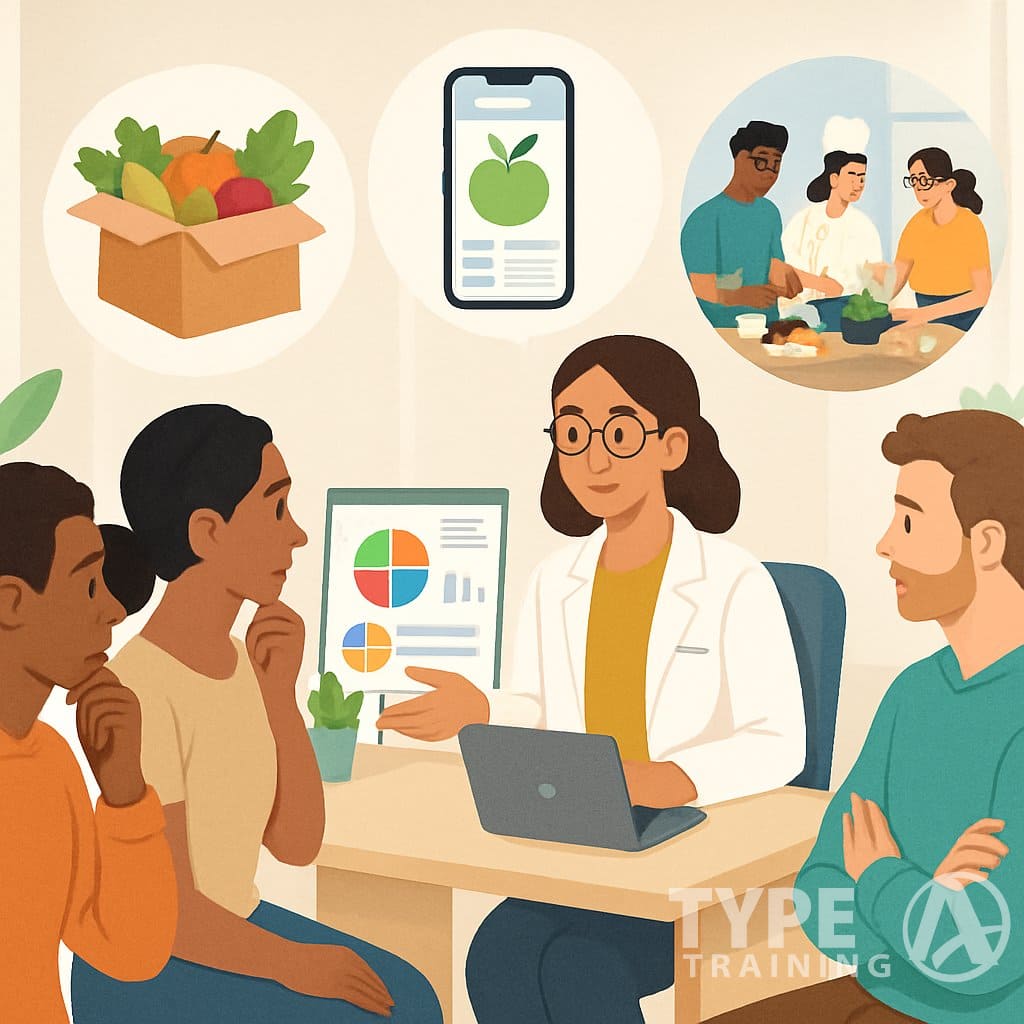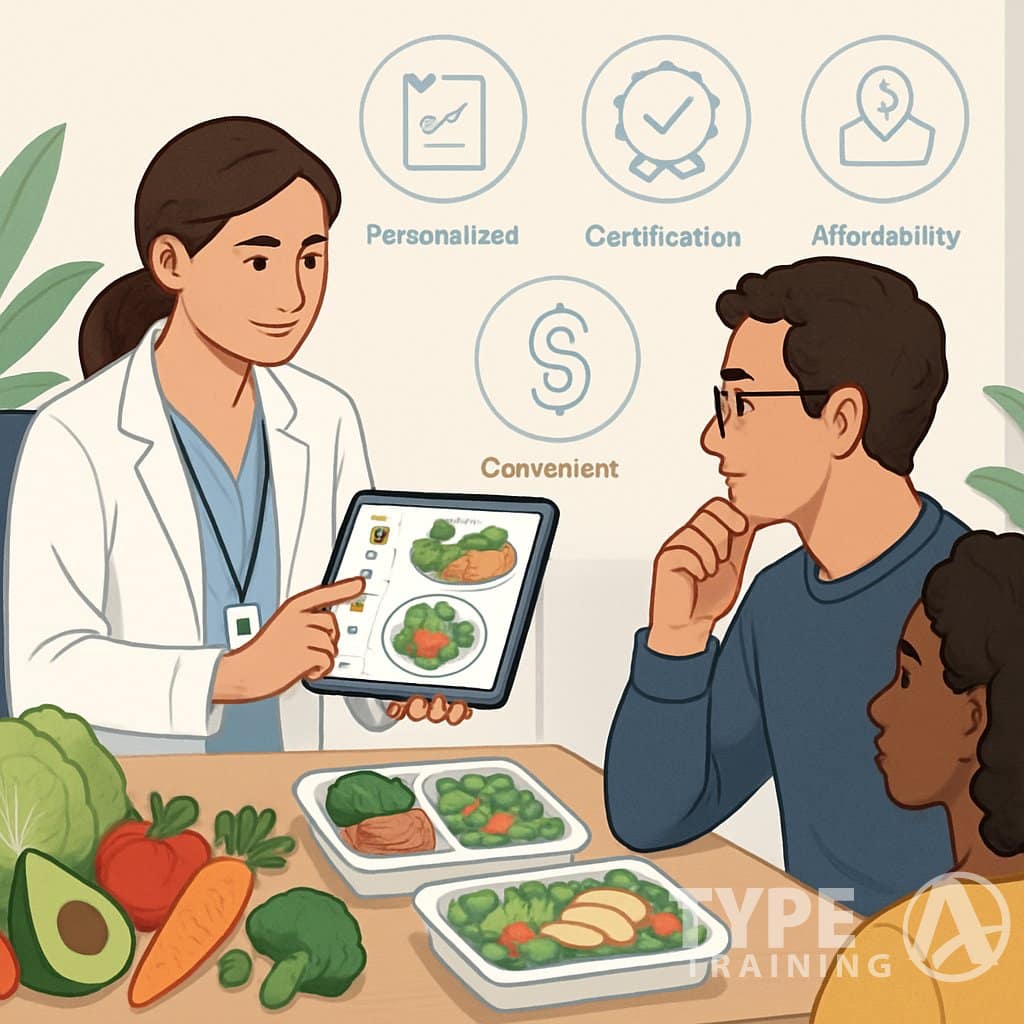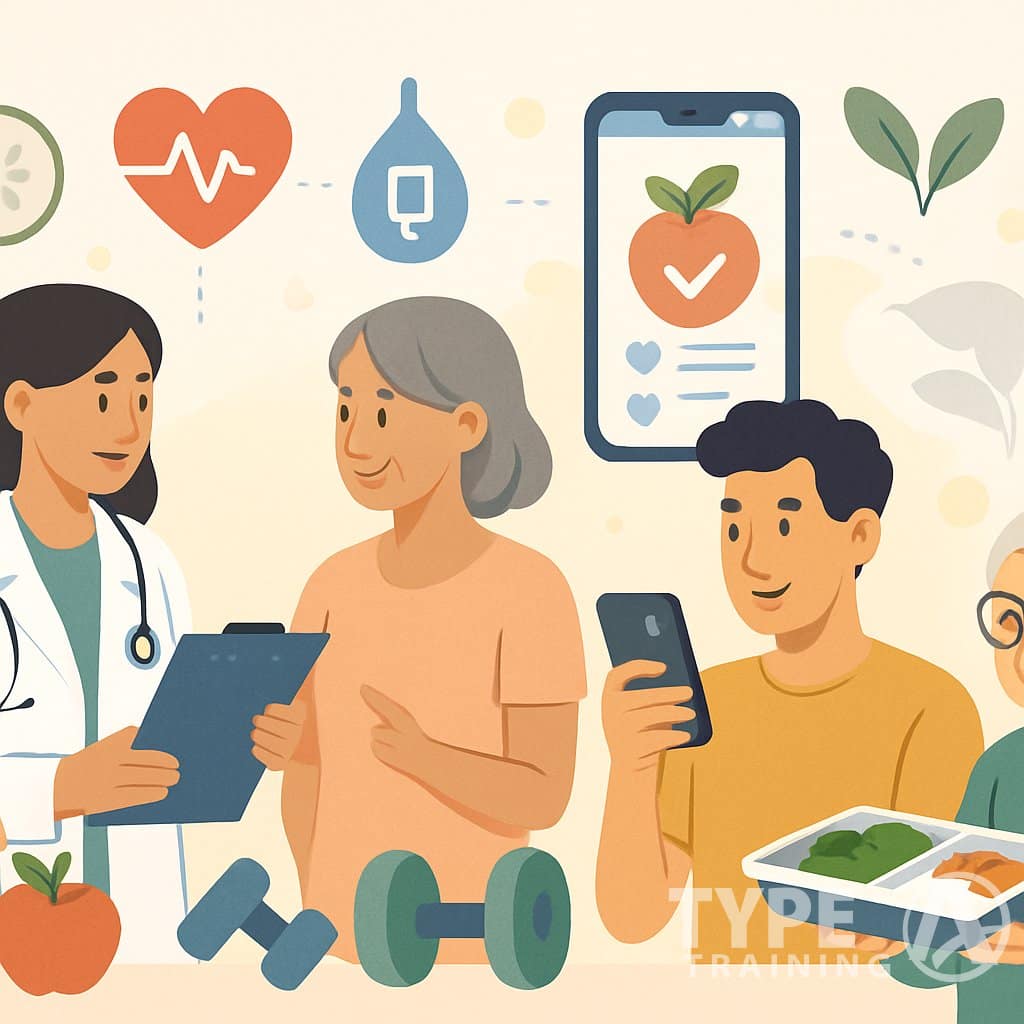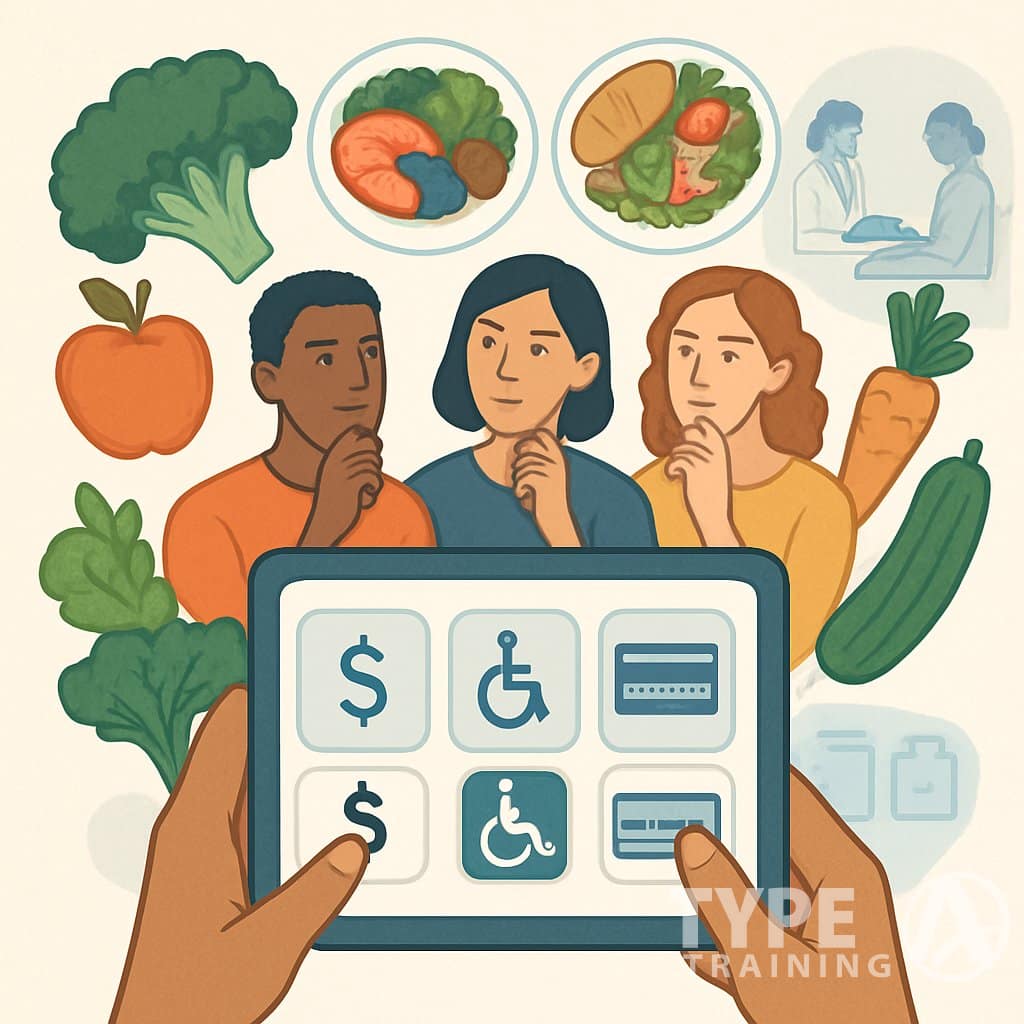TL;DR
Finding the right nutrition service means matching your health needs with properly credentialed professionals. Registered dietitians offer medical nutrition therapy for chronic conditions and are covered by most insurance, while nutritionists and health coaches vary widely in training and focus on general wellness. Consider your budget, health conditions, insurance coverage, and whether you need medical treatment or lifestyle guidance when choosing a provider.
Finding the right nutrition service can feel overwhelming these days. There are registered dietitians, nutritionists, wellness coaches—all with different training and expertise.
Understanding these differences matters for your health and safety.

Popular posts:
The key is matching your health goals and medical needs with a professional who actually has the right credentials and training. Not everyone who calls themselves a nutrition expert brings the same education or oversight.
Some can offer medical nutrition therapy for diabetes or eating disorders. Others stick to general wellness advice.
Your choice depends on a bunch of things: your budget, health conditions, how you like to communicate, and whether you want ongoing support or just one-time advice.
Take some time to research credentials and understand what each service actually offers. It’s worth it for your long-term health.
Key Takeaways
- Credentials matter: Registered dietitians (RDs/RDNs) have the most comprehensive training and can provide medical nutrition therapy, while “nutritionist” is often an unregulated title with varying qualifications.
- Match services to your needs: Medical conditions like diabetes or eating disorders require registered dietitians, while general wellness goals can be addressed by qualified nutritionists or health coaches.
- Insurance coverage varies: Most health plans cover nutrition services from registered dietitians for specific medical conditions with a doctor’s referral, but coverage limits and requirements differ by plan.
- Format flexibility exists: Choose between in-person visits, telehealth consultations, group programs, or app-based support depending on your schedule, location, and communication preferences.
- Cost ranges significantly: Initial consultations run $100-$350 without insurance, but in-network providers, employer wellness programs, and sliding scale fees can reduce out-of-pocket expenses.
- Verify credentials thoroughly: Always check qualifications through official registries like the Commission on Dietetic Registration and read reviews from clients with similar health needs.
- Specialization improves outcomes: Providers who focus on your specific condition (diabetes, sports nutrition, eating disorders) deliver more effective, personalized guidance than generalists.
Understanding Nutrition Services

Nutrition professionals have different education, training, and scopes of practice. Registered dietitians have the most clinical training.
Nutritionists and health coaches offer support with varying requirements.
Differences Between Dietitians, Nutritionists, and Health Coaches
Registered Dietitians (RDs) or Registered Dietitian Nutritionists (RDNs) have the most comprehensive credentials. They finish an accredited degree in dietetics and complete supervised clinical training.
The Academy of Nutrition and Dietetics certifies them. Only registered dietitians can legally assess, diagnose, and treat nutrition issues tied to medical conditions.
Nutritionists come with a wide range of qualifications. In most places, anyone can call themselves a nutritionist.
Some have real certifications or degrees in nutrition science, though. Registered nutritionists meet specific education requirements and usually focus on general nutrition education, not medical nutrition therapy.
Health coaches and nutrition coaches help with lifestyle changes and general wellness. Their training can be anything from a weekend course to a full program.
They don’t provide medical nutrition therapy. Most focus on changing habits, meal planning, and accountability—not treating health conditions.
What a Registered Dietitian Nutritionist Offers
Registered dietitian nutritionists give medical nutrition therapy for diagnosed conditions. They work with diabetes, heart disease, eating disorders, digestive issues, and food allergies.
RDNs work in hospitals, clinics, private practice, and community settings. They team up directly with your doctors and specialists.
Clinical services include:
- Nutrition assessment and diagnosis
- Personalized meal planning for medical conditions
- Supplement recommendations based on lab results
- Eating disorder treatment
- Tube feeding management
General services include:
- Weight management counseling
- Sports nutrition planning
- Family nutrition education
- Grocery shopping guidance
Insurance may cover visits with registered dietitians if medically necessary. They have to do continuing education to keep their credentials.
Roles of Nutrition Professionals
Registered dietitians are the go-to experts for medical nutrition issues. They turn complex nutrition science into meal plans you can actually follow.
They work in hospitals, schools, sports teams, and private practice. Some focus on areas like pediatric nutrition or kidney disease.
Nutritionists often work in public health, food policy, or general wellness. Qualified nutritionists may do research, work for food companies, or run community programs.
They give nutrition info and basic meal guidance. They can’t treat medical conditions unless a registered dietitian or doctor supervises them.
Health coaches and nutrition coaches help with daily habits and motivation. They’ll help you set goals and stick to your nutrition plans.
These pros are great at behavior change. They teach meal prep skills, help with social eating situations, and offer encouragement between appointments.
Factors to Consider When Choosing a Nutrition Service

Picking the right nutrition service takes some real thought about your health needs, the provider’s qualifications, and whether they can handle your situation.
Key things to match: your health goals, the provider’s credentials, and their training for your conditions.
Your Health Goals and Needs
Start with your current health status. If you have chronic diseases like diabetes, heart disease, or high cholesterol, you’ll need medical nutrition therapy from someone qualified.
People with eating disorders need providers trained in mental health and nutrition. General wellness goals don’t require as much specialization as chronic disease management.
Think about whether you need:
- Medical nutrition therapy for chronic diseases
- Weight management support
- Sports nutrition guidance
- Eating disorder treatment
- General wellness coaching
Insurance coverage matters too. Some providers bill insurance directly; others don’t. This changes what’s affordable long-term.
Professional Credentials and Experience
Nutrition professionals come with different backgrounds. Registered Dietitians (RDs) have the most education and can give medical nutrition therapy for chronic conditions.
RDs complete a degree in dietetics plus a dietetic internship. They pass a national exam and keep up with continuing education.
Nutritionists don’t have standard requirements. Their qualifications can be anything from advanced degrees to very little formal training. Some are highly qualified, but you have to check each one.
Health coaches focus on lifestyle changes, not medical nutrition therapy or specialized meal plans. They’re best for general wellness, not medical needs.
Scope of Practice and Specializations
Each provider type has different abilities and limits. RDs can diagnose nutrition problems, create medical meal plans, and work with your doctor on chronic conditions.
Nutritionists usually can’t provide medical nutrition therapy or bill insurance. What they can do depends on their training and state laws.
Health coaches can’t:
- Order or interpret lab tests
- Prescribe supplements
- Treat medical conditions
- Create therapeutic meal plans
Look for someone who specializes in your needs. Some focus on diabetes, others on eating disorders or sports nutrition.
Verifying Qualifications
Always check credentials before you start. For RDs, use the Commission on Dietetic Registration website. Make sure licenses are current and valid.
Ask nutritionists about their education, certifications, and experience. Look for degrees in nutrition science or similar fields from accredited schools.
Read reviews on Google, healthcare sites, and social media. Focus on feedback from people with similar health needs.
Red flags:
- Promising quick fixes
- Pushing expensive supplements
- Using outdated research
- No credentials you can verify
- Bad or missing reviews
If you’re worried about a provider’s qualifications or conduct, contact your state’s licensing board.
Types of Nutrition Services Available
Nutrition services come in lots of forms to fit different needs and lifestyles. You can get medical treatment, personal counseling, group support, or online programs, depending on what works for you.
Medical Nutrition Therapy
Registered dietitian nutritionists provide medical nutrition therapy for diagnosed conditions. You’ll usually need a prescription or referral from your doctor.
Common conditions treated:
- Diabetes and blood sugar management
- Heart disease and high cholesterol
- Eating disorders
- Digestive issues like IBS or Crohn’s
- Kidney disease
- Food allergies and intolerances
Insurance often covers these sessions if they’re medically necessary. The dietitian works with your healthcare team to build a treatment plan.
Sessions focus on managing your condition with specific dietary changes. You get detailed meal plans and learn how foods affect your symptoms or lab results.
One-on-One Counseling and Consultation
Private nutrition counseling gives you personalized attention. These sessions usually happen in private practices or healthcare facilities with a registered dietitian nutritionist.
Services usually include:
- Nutrition assessment
- Personal meal planning
- Grocery store tours
- Cooking instruction
- Progress monitoring
Initial sessions last 45-60 minutes, follow-ups 30-45 minutes. You discuss eating habits, health history, and lifestyle.
The dietitian creates a custom plan that fits your schedule, food preferences, and budget. This works for weight management, sports nutrition, or just eating healthier.
Group Programs and Support
Group nutrition programs bring together people with similar goals or conditions. These cost less than individual counseling and offer peer support.
Common group formats:
- Diabetes education classes
- Weight management programs
- Heart-healthy cooking workshops
- Corporate wellness seminars
Groups usually meet weekly for 6-12 weeks. Each session covers topics like meal prep, reading food labels, or managing cravings.
You learn from both the nutrition pro and other group members. The shared experience can be motivating and help you stay on track.
Virtual and In-Person Options
You can get nutrition support by video call, phone, or in person. Virtual options have opened up access to specialized dietitians all over.
In-person perks:
- Hands-on food demos
- Body composition checks
- Direct interaction with materials
Virtual perks:
- Access to specialists anywhere
- No travel required
- Often lower cost
- Flexible scheduling
Many registered dietitian nutritionists offer both. You might start virtually, then go in-person when needed, or mix both for what works best.
Matching Services to Your Health Conditions and Lifestyle
Different health issues need specific types of nutrition support. Your lifestyle will also help decide which service format fits you best.
Some people need medical nutrition therapy for chronic conditions. Others just want basic meal planning or ongoing support for habit change.
Weight Management and Weight Loss
Weight loss services should help you build habits that last—not just quick fixes. Look for programs with personalized nutrition plans based on your eating patterns and preferences.
Registered dietitians give the most complete approach to weight management. They can spot underlying health issues and set safe calorie targets.
Many nutrition services now offer virtual consultations for weight loss. Handy if you need regular check-ins but have a tight schedule.
Key things to look for:
- Meal plans tailored to your food preferences
- Regular progress checks and plan tweaks
- Education on portion control and healthy choices
- Support for building sustainable habits
Skip programs that promise rapid weight loss or push lots of supplements. Real weight management happens slowly, through changes you can actually stick with.
Diabetes Management and Chronic Disease Care
Diabetes and other chronic conditions need medical nutrition therapy from qualified pros. Only registered dietitians can do this and bill insurance.
Diabetes management means learning carb counting, meal timing, and blood sugar monitoring. Your nutrition service should work with your doctor so your eating plan fits your medication schedule.
Pick providers with experience in your condition. Someone focused on diabetes will understand how foods affect blood sugar better than someone who just does general wellness.
Key services for chronic disease:
- Personalized carb targets and meal timing
- Education on reading labels and managing portions
- Strategies for eating out and social events
- Regular checks of lab values like A1C or cholesterol
Many healthcare systems include nutrition counseling in chronic disease programs. That way, your dietitian can talk directly with your medical team.
Meal Planning and Healthy Eating
Meal planning services can be as simple as recipe suggestions or as detailed as weekly menus. Choose based on how much structure you want.
Some people just want basic nutrition guidance for balanced meals. Others need shopping lists and prep tips for busy weeks.
Digital meal planning tools work if you’re tech-savvy and don’t need much personal support. They’re usually cheaper than seeing someone one-on-one.
For families or people with food allergies, find services that can handle multiple dietary needs in one plan. It saves time and cuts down on food waste.
Meal planning options:
- Meal delivery with nutrition info
- Weekly menus with shopping lists and recipes
- Flexible guidance for building your own meals
- Family plans that work for everyone at home
Behavior Change and Ongoing Support
Behavior change support helps you build lasting healthy eating habits. It goes beyond just getting nutrition advice—it’s about motivation and accountability, too.
Health coaches really shine when it comes to helping people stick to new routines. They help you overcome obstacles and focus on gradual changes that actually fit your life.
Look for services that offer regular check-ins. That could mean phone calls, video chats, or even just messaging apps.
Consistent contact helps keep motivation up between appointments. It’s easy to lose steam otherwise.
Effective behavior change programs include:
- Goal setting that breaks big changes into small steps
- Problem-solving strategies for common challenges
They also provide accountability through regular progress reviews. Flexibility matters, too—plans should adjust when life throws you a curveball.
Group programs can offer peer support and usually cost less than individual counseling. If you’re motivated by community, this might be the way to go.
Cost, Accessibility, and Insurance Coverage
The financial side of nutrition services is all over the map. It depends on your insurance plan and the provider you pick.
Most insurance plans cover registered dietitians under specific conditions. Costs can range from free to several hundred dollars per session.
Understanding Insurance Options
Most health insurance plans cover nutrition counseling because of Affordable Care Act requirements. Your plan probably covers services from registered dietitians (RDs) and registered dietitian nutritionists (RDNs) as preventive care.
Coverage typically requires:
- A doctor’s referral
- Treatment for specific conditions like diabetes or heart disease
You usually need to work with licensed, in-network providers. Most plans have annual session limits, so keep that in mind.
Some plans pay 100% of nutrition services with no out-of-pocket costs. Others might require copays or apply costs to your deductible.
Call your insurance company directly to get the details on your coverage. Ask about referral requirements, session limits, and which health conditions qualify.
Comparing Costs and Payment Models
Without insurance, initial nutrition consultations cost $100 to $350. Follow-up visits usually run $50 to $150 per session.
Common payment options include:
- Insurance billing: Lowest cost if you’re covered
- Cash pay: Sometimes comes with package deals or sliding scale fees
- Health savings accounts: These can cover nutrition services
- Employer wellness programs: You might get free or discounted services
In-network providers almost always cost less than out-of-network ones. Some nutrition services offer payment plans or reduced rates if your income qualifies.
Service Accessibility and Platform Choices
Nutrition services come in several formats, so you can pick what works for your schedule and location.
Access options include:
- In-person office visits
- Telehealth video calls
- Phone consultations
- Mobile apps with dietitian support
- Group sessions or classes
Telehealth has really opened up nutrition services, especially for folks in rural areas.
A lot of insurance plans now treat virtual nutrition visits the same as in-person ones.
Think about your comfort with technology and how reliable your internet is before picking a virtual service.
Some people just like face-to-face interactions. It can feel more personal and help with accountability, honestly.
Frequently Asked Questions
What is the difference between a registered dietitian and a nutritionist?
A registered dietitian (RD) or registered dietitian nutritionist (RDN) must complete an accredited bachelor’s degree in dietetics, finish 900-1,200 hours of supervised clinical practice, pass a national examination, and maintain continuing education credits. They’re legally qualified to provide medical nutrition therapy and treat diagnosed health conditions. The Commission on Dietetic Registration oversees their credentials.
The term “nutritionist” is largely unregulated in most states, meaning anyone can use this title regardless of education or training. Some nutritionists hold advanced degrees in nutrition science and legitimate certifications, while others may have completed only brief online courses. Nutritionists typically cannot diagnose conditions, provide medical nutrition therapy, or bill insurance unless they also hold RD credentials. Always verify specific qualifications before working with someone calling themselves a nutritionist.
Does insurance cover nutritionist or dietitian visits?
Most health insurance plans cover visits with registered dietitians for medical nutrition therapy when deemed medically necessary. The Affordable Care Act requires many plans to cover preventive nutrition counseling for conditions like diabetes, obesity, cardiovascular disease, and eating disorders. Coverage typically requires a physician referral and treatment of a diagnosed condition rather than general wellness goals.
Insurance rarely covers services from nutritionists or health coaches unless they also hold RD/RDN credentials. Check your specific plan’s requirements—most limit the number of covered sessions per year (commonly 3-10 visits) and require you to see in-network providers. Medicare Part B covers medical nutrition therapy for diabetes and kidney disease with a doctor’s referral. Always call your insurance company before scheduling to verify coverage details, copay amounts, and whether prior authorization is needed.
How much does nutrition counseling cost without insurance?
Initial nutrition consultations with registered dietitians typically cost between $100-$350, depending on location, provider experience, and session length (usually 60-90 minutes). Follow-up appointments range from $50-$150 for 30-45 minute sessions. Urban areas and specialists with advanced certifications generally charge higher rates than rural providers or those in group practice settings.
Many registered dietitians offer package deals that reduce per-session costs—for example, $600 for five sessions instead of $750 individually. Some providers use sliding scale fees based on income. Nutritionists and health coaches without RD credentials often charge $75-$200 for initial sessions and $50-$100 for follow-ups. Virtual consultations sometimes cost less than in-person visits. Ask about payment plans, Health Savings Account (HSA) or Flexible Spending Account (FSA) eligibility, and whether receipts can be submitted for potential insurance reimbursement.
When should I see a registered dietitian instead of a nutritionist?
See a registered dietitian if you have any diagnosed medical condition requiring nutrition intervention: diabetes, heart disease, high cholesterol, kidney disease, digestive disorders (IBS, Crohn’s, celiac), eating disorders, food allergies, or cancer. RDs are trained in medical nutrition therapy and can create treatment plans that coordinate with your medications and medical team. They can interpret lab results, adjust recommendations based on your health status changes, and provide evidence-based protocols.
You should also choose an RD if you’re pregnant or breastfeeding, need pediatric nutrition guidance, require tube feeding management, or have complex dietary restrictions. Registered dietitians are essential for anyone whose nutrition directly impacts their medical treatment or disease management. For general wellness, weight loss without medical complications, basic meal planning, or lifestyle coaching, a qualified nutritionist or health coach may be sufficient and more affordable. When in doubt, start with an RD—they can refer you to other professionals if appropriate.
What credentials should I look for in a nutrition professional?
For registered dietitians, verify they hold RD or RDN credentials through the Commission on Dietetic Registration website. Look for additional certifications in specialty areas relevant to your needs: Certified Diabetes Care and Education Specialist (CDCES), Certified Specialist in Sports Dietetics (CSSD), or Board Certified Specialist in Oncology Nutrition (CSO). State licensure requirements vary, so check your state’s regulations—many require LDN (Licensed Dietitian Nutritionist) credentials.
For nutritionists, seek those with degrees (BS, MS, or PhD) in nutrition science, food science, or related fields from accredited universities. Certifications from reputable organizations include Certified Nutrition Specialist (CNS) requiring a graduate degree and examination, or Certified Clinical Nutritionist (CCN). For health coaches, look for credentials from National Board Certified Health & Wellness Coach (NBC-HWC) or certifications from established programs like Duke Integrative Medicine or Wellcoaches. Avoid providers with credentials from unaccredited online programs or those promising unrealistic results.
Is online nutrition counseling as effective as in-person visits?
Research shows that virtual nutrition counseling produces comparable outcomes to in-person sessions for most conditions, including weight management, diabetes control, and general nutrition education. Online sessions offer significant advantages: access to specialists regardless of location, elimination of travel time and costs, flexible scheduling including evenings and weekends, and comfort of meeting from home. Many people find virtual consultations less intimidating and easier to fit into busy schedules.
Virtual nutrition counseling works well for ongoing support, education, meal planning, and accountability. However, in-person visits may be preferable for initial assessments requiring body composition measurements, hands-on cooking demonstrations, grocery store tours, or situations where you prefer face-to-face interaction. Some conditions, particularly eating disorders requiring close monitoring, may benefit from in-person care initially. Many providers offer hybrid models—starting virtually then transitioning to in-person when needed, or alternating between formats. Most insurance plans now cover telehealth nutrition visits at the same rate as office visits.
How many sessions will I need with a nutrition professional?
The number of sessions depends on your goals and situation complexity. For general nutrition education or basic meal planning, 1-3 sessions may suffice. Weight management typically requires 6-12 sessions over 3-6 months for sustainable results. Chronic disease management like diabetes or heart disease often needs monthly sessions for the first 3-6 months, then quarterly maintenance visits. Eating disorder treatment requires weekly or biweekly sessions for months to years depending on severity.
Your initial consultation will help establish a timeline. Most providers recommend starting with weekly or biweekly sessions to establish new habits and troubleshoot challenges, then spacing out to monthly visits as you gain confidence and see results. Expect the first session to cover assessment, goal-setting, and education, with follow-ups focusing on progress monitoring, problem-solving obstacles, and plan adjustments. Be realistic—nutrition changes take time, and research shows regular follow-up significantly improves long-term success compared to one-time consultations. Insurance coverage limits may influence your session frequency.










